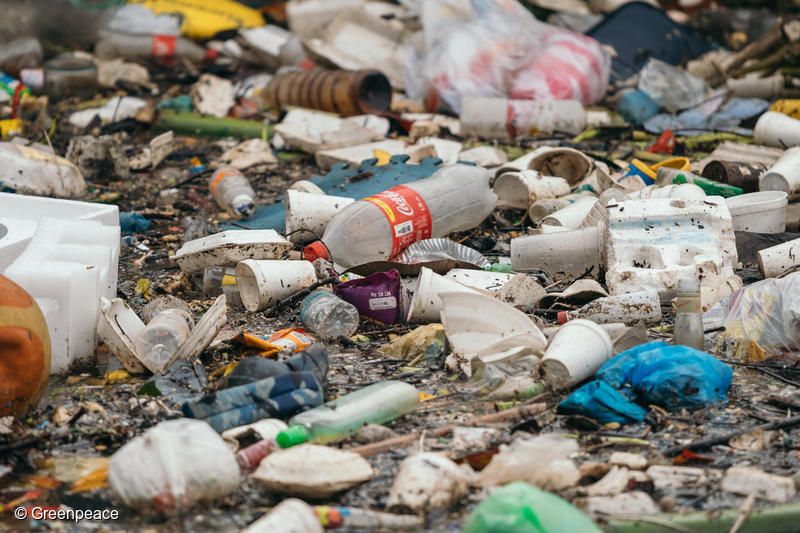· 4 min read
Within a few generations, plastic pollution has become one of the world’s most pressing environmental challenges, impacting our health, our communities, our planet and our climate.
While this is shocking, this does not come as a surprise - it is estimated that of all the plastic waste ever produced only 9% was recycled[1], and with production projected to increase in the years to come, we will never be able to solve this crisis with waste management and cleanups.
Plastics hardly ever decompose entirely, but instead, break down into smaller pieces light enough to float around in the air we breathe, and small enough to enter and accumulate in our organs, tissues and blood with ease[2].
Plastic pollutes throughout its entire lifecycle, from the extraction of fossil fuels, transport, manufacturing, and consumption of the product up to its disposal. Each stage is linked to carbon emissions, air and waterway pollution, ecosystem degradation, social injustice, and human health impacts.
Corporations’ mass production of plastics and a broken waste management system have caused a worldwide pollution crisis. And yet, corporations such as Coca-Cola, PepsiCo, and Nestlé, in league with the petrochemical industry, keep making more.

So far, companies are focusing on false solutions to solve the problem, like switching from single-use plastic to other throwaway materials, or investing heavily in a broken recycling system while ramping up their plastic production. We cannot be at the mercy of voluntary commitments that big brands themselves continue to fail.
We urgently need a solution that will match the scale of the plastics crisis.
The good news
Momentum is growing and a dedicated, unstoppable global movement is demanding for bolder action against the plastic pollution crisis - and that is the Global Plastics Treaty.
Together with our allies and supporters, we demand an ambitious global plastics treaty that will keep oil and gas in the ground, hold big polluters accountable for their excessive plastic production and build refill and reuse systems. We need a strong plastics treaty that will deliver a safer planet and a better future for us and for our children.
So what do we need for a strong plastics treaty? Mainly three things.
1) Just transition
The impacts of plastic pollution are disproportionately borne by people in the Global South, socio-economically challenged communities, and people of colour. Therefore, we need to ensure a meaningful engagement throughout the negotiation process and a fair and equitable transition for groups especially impacted by the plastic pollution crisis, such as frontline communities, informal and formal waste pickers and indigenous peoples.
2) Reduction
Reducing the production and consumption of plastics in the first place and shifting towards, or scaling up, circular business models. As written in the mandate, the treaty aims to achieve ‘sustainable (levels of) production’ for plastic. To achieve this the following points should be implemented.
Phase-out of unnecessary or problematic single-use plastics such as flexible plastics and complex multi-layered packaging (eg. sachets).
An immediate cap on virgin plastic production to 2017 levels- the year the United Nations declared plastic pollution a global transboundary crisis, followed by significant, annually increasing reductions in the production and use of plastic.
Immediately eliminate known highly problematic polymers and chemicals. These include, but are not limited to, polyvinyl chloride (PVC), polystyrene (PS), polyurethane (PUR), polycarbonate (PC), polyfluorinated alkyl substances (PFAs).
The industry and governments continue to promote recycling as the ideal way out of the plastic crisis when they know that recycling has never been a viable solution to the problem. Plastics are hard to collect, not an economically feasible way of waste management and are posing a toxicity risk that impacts the health and well-being of our communities[3]. Even if all these problems would be solved, the sheer amount of plastics we are consuming every day is overwhelming our recycling facilities.
So, instead of trying to recycle our way out of this crisis, the mantra should be “reduce, reuse, and refill”.
3) Transparency and reporting
For any international agreement, a comprehensive national reporting framework is essential. It enables progress to be measured. It also provides important information on sources and pathways, complements top-down environmental monitoring, identifies priorities and improves overall effectiveness. For these reasons, it is important to have a comprehensive national reporting framework in place and full transparency on all plastics produced, used and/or consumed, imported and exported.
Now, with the first Intergovernmental Negotiation Committee (INC 1) happening this week (28 Nov - 2 Dec), the real work begins on ensuring that our demands will turn into an ambitious and comprehensive treaty. Let’s end the age of plastic, for the sake of our climate and our communities.
References
[2] https://www.sciencedirect.com/science/article/pii/S0160412022001258
[3] https://www.greenpeace.org/usa/wp-content/uploads/2022/10/GPUS_FinalReport_2022.pdf
illuminem Voices is a democratic space presenting the thoughts and opinions of leading Sustainability & Energy writers, their opinions do not necessarily represent those of illuminem.
Cover photo: Plastic Waste in Verde Island, Philippines. © Noel Guevara / Greenpeace






